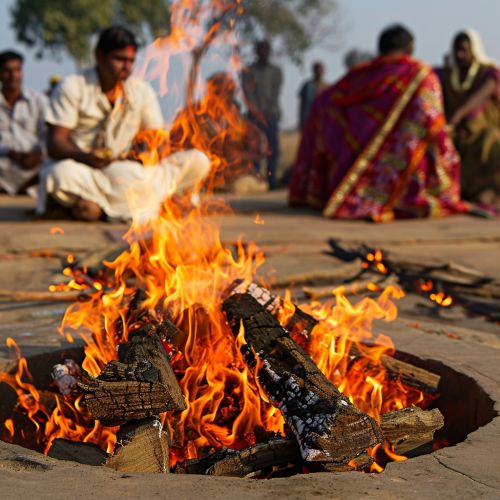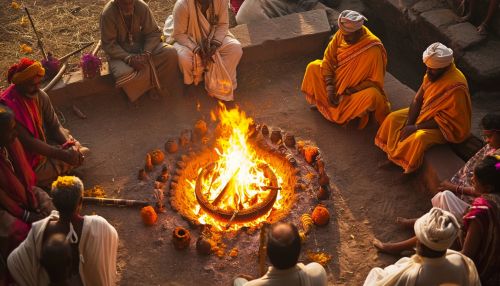Yajna
Introduction
Yajna (also spelled Yajna, Yagna or Yagya) is a ritual of sacrifice derived from the practice of Vedic religion, where it played a central role. It is a complex process involving the kindling and consecration of a sacrificial fire, the invocation of one or more deities, and the making of offerings (both physical and verbal) to them, with the aim of benefiting the practitioner, the environment, and the universe at large. Yajna has been a part of an individual's or a community's rites of passage since the Vedic times.
Etymology and Concept
The term Yajna comes from the Sanskrit yaj, which means 'to worship' or 'to offer'. It is related to the Avestan term yasna of Zoroastrianism. Yajna is an ancient ritual of offering and sublimating the havana sámagri (herbal preparations) in the fire. The sublime meaning of the word yajna is derived from the Sanskrit verb yaj, which has a three-fold meaning of worship of deities (devapujana), unity (saògatikaraña), and charity (dána). An essential element of the ritual is the sacrificial fire - the divine Agni - into which oblations are poured, as everything that is offered into the fire is believed to reach the gods.
Historical Development
The practice of Yajna is deeply embedded in the Hindu tradition, tracing its roots back to the earliest of the Vedas, the Rigveda. The ritual evolved over time, with the Brahmana literature detailing the performance of these rituals, which were complex and could last for days, involving multiple priests with different roles. The Yajna rituals were adopted by Buddhism and Jainism. These rituals were also found in the pre-Zoroastrian Avesta tradition, and they are one of the oldest practices in Zoroastrianism.
Types of Yajna
There are many types of Yajna, and they can be categorized in various ways: based on the nature of the offerings, the number of priests involved, the length of the ceremony, and so forth. Some of the major types of Yajna include the Ashvamedha (horse sacrifice), Rajasuya (royal consecration sacrifice), and Agnihotra (fire-oblation). Each of these has its own specific purpose and set of rituals associated with it.
Philosophical Interpretations
The philosophy of Yajna has been interpreted in various ways by different philosophical schools of Hinduism. The Mimamsa school, for instance, considers Yajna as a means to sustain the gods, while the Vedanta school views Yajna as a symbolic representation of spiritual growth and selfless action.
Yajna in Modern Times
In modern times, Yajna is often performed at Hindu festivals, temples, and on special occasions, but the scale is much smaller than in Vedic times. It is also found in modern Jainism and Buddhism. The ritual has also been incorporated into some New Age and neo-pagan practices in the West.
See Also


